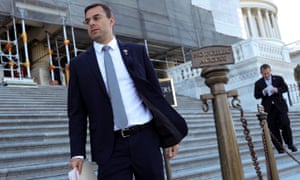The Republican turned Libertarian announced plans to jump in the race with the hopes he can rally voters disaffected by Trump

Photograph: Jonathan Ernst/Reuters
Michigan congressman Justin Amash late on Tuesday announced plans to jump into the 2020 presidential race. Amash, a former Republican turned Libertarian, had toyed with the idea for a while. His argument has been that he could rally voters disaffected by Donald Trump but uninterested in voting for a Democrat.
Amash, a five-term congressman, is known as a gadfly who has bucked Republican leadership and eagerly skirmished with his colleagues when he was a Republican. In July 2019 Amash, the only Republican congressman to vocally support impeaching Trump, left the Republican party.
In announcing the creation of his presidential exploratory committee, a largely ceremonial step in American politics, Amash said on Twitter: “We’re ready for a presidency that will restore respect for our Constitution and bring people together. I’m excited and honored to be taking these first steps toward serving Americans of every background as president.”
Here’s what you need to know about the Libertarian presidential candidate.
Who is Amash?
Amash, 40, is a lawyer by trade who first served in the Michigan statehouse before ascending to the US Congress in 2010 during the Tea Party wave. Amash, in his first campaign, benefited from support from major Tea Party groups.
In 2019 Amash left the Republican party in protest of its seemingly immovable support for Donald Trump. He decided to join the Libertarian party and has served as one of the few members of Congress not part of the Republican or Democratic party.
Could Amash’s candidacy have an impact in the 2020 presidential election?
It’s possible. Amash, a fiscal conservative, could siphon away right-leaning voters disinclined to vote for Trump from former vice-president Joe Biden. Or his candidacy could attract small-government Republicans away from Trump to the benefit of Biden.
His chances of winning the presidency are slim. Amash is getting into the race late and no presidential candidate running on the Libertarian party has ever actually been elected president. They usually perform poorly.
What is his relationship with Trump?
Contentious. Amash has been a vocal critic of the president and the feeling is mutual. When Amash announced he was leaving the Republican party, Trump tweeted: “Great news for the Republican Party as one of the dumbest & most disloyal men in Congress is ‘quitting’ the Party. No Collusion, No Obstruction! Knew he couldn’t get the nomination to run again in the Great State of Michigan. Already being challenged for his seat. A total loser!”
(Amash, at times, has been mentioned as a potential candidate for statewide office but has never actually run for Senate or governor.)
Does Amash have a chance?
It’s unclear what impact Amash will have in this election. The coronavirus pandemic has already upended some of the normal rules of presidential campaigning. Amash himself is a relative unknown compared with Trump or Biden as well.
Almost a year ago a poll for the Detroit News found that Amash would draw about 10% of the vote to him in a three-way race. Biden, the poll found, would have the plurality with Trump trailing the former vice-president by just a few percentage points.
But more recently data from Morning Consult suggested that Amash’s presence in the race would have essentially no impact at all.
What happens next?
Amash will have to move quickly to assemble a presidential campaign. That includes not just staffers but also the requisite amount of support to have any impact at all. Amash has already been in contact with the Libertarian party’s chairman.
But Amash will also have to devote a significant amount of time to ballot access, making efforts to appear on voters’ ballots as a libertarian presidential candidate alongside Trump and Biden. That’s been a persistent hurdle for third-party candidates. The Libertarian party is on the ballot of 35 states, meaning there’s room for growth in a candidate like Amash.
Still, it’s an uphill battle.




